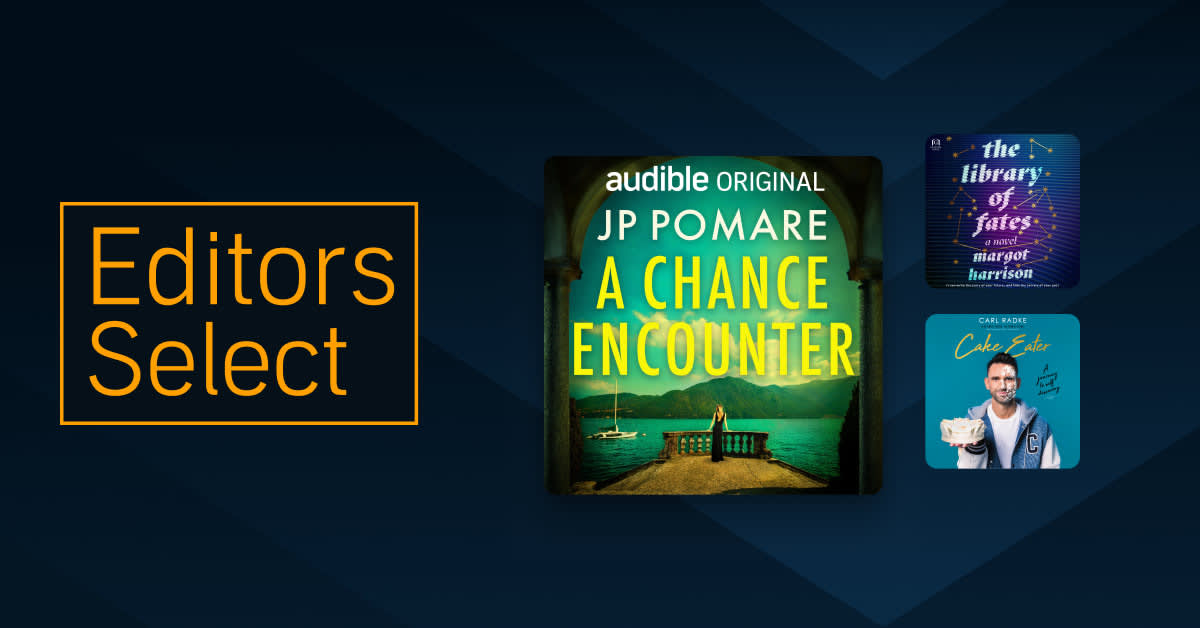This post was originally published on Audible.com.
While it’s technically the start of a new year, January lacks a bit of the exhilarating, clean-slate energy of, say, September. Still, after the indulgences of the holidays, it’s a great time to reevaluate our priorities, take stock of our habits, and set some intentional goals for the year ahead. Whatever that looks like for you—whether small, incremental progress or big, sweeping changes—we’ve got listening recommendations to support some of the most common New Year’s resolutions. Scroll through our list to find your goals or get ideas for new ones, and read our picks for the best audiobooks to help you achieve them.
Resolution: Eat healthier
As I’ve grown older and wiser I’ve started to rethink the concept of “comfort food.” And since I consumed a metric ton of sausage stuffing, chocolate, and cookies last month, I’m really rethinking it. Because I actually feel best, and most comforted, when I’m eating a nutritious diet (I just need to be reminded sometimes). And there’s no one better to remind me than Uma Naidoo, a nutritional psychiatrist and trained chef. In her sequel to This Is Your Brain on Food, she tackles the world’s most diagnosed mental health condition—one that she herself suffers from: anxiety. (I’ve been known to be a bit anxious myself). What Naidoo understands maybe better than anyone is that anxiety is rooted not just in our minds but in our guts. And this listen is just the inspiration I need to put the sausage stuffing behind me and start the new year with the ingredients for a healthy body and mind. Bon appétit! —Phoebe N.
Resolution: Embrace underconsumption
I don’t have many vices, and most of them are innocuous—we’re talking penchants for a sweet treat here and a hot bubble bath there. But one habit I’m less than proud of is my relationship with, well, stuff. I’ve long been a consumer of trinkets, assigning sentimentality to objects I shouldn’t be spending money on, let alone bringing into my already cluttered apartment. If I’m really being honest, I struggle with purchasing things I don’t need, snapping up clothes simply because they’re on sale, or impulsively grabbing yet another novelty mug or pack of gel pens regardless of how many I already own. It’s a tendency directly at odds with my firmly held stance on living green and doing no harm to the planet we inhabit. That’s why this year I’m making a conscious effort to ditch overconsumption, cull and organize what I already own, and live a life that’s simpler and more sustainable. To motivate myself further by truly understanding what’s at stake, I’m listening to Naomi Klein’s This Changes Everything, an assessment of capitalism’s correlation with the climate crisis and the decisions we can make as individuals to ameliorate the effects of unfettered consumerism. —Alanna M.
Resolution: Handle the haters
There’s one thing in life that’s more sure than death and taxes, and that’s people getting in the way of your dreams. Thankfully, the latest audiobook from Mel Robbins, bestselling author of The 5 Second Rule, promises to teach us how to reclaim our power from the naysayers, doubters, and saboteurs using just two deceptively simple words: let them. Robbins's blend of relatable examples, scientific research, and practical advice told through her signature down-to-earth storytelling makes this audiobook accessible and applicable for listeners from all walks of life. Whether you're seeking to improve your career, deepen your relationships, or simply find more happiness in your daily life, The Let Them Theory offers valuable insights and tools that could make a real difference. Plus, find out what Mel Robbins' goal is this year in our interview. —Rachael X.
Resolution: Transform my money mindset
Doing well with money isn’t necessarily about what you know. It’s about how you behave. And behavior is hard to teach, even to really smart people. Acclaimed author Morgan Housel uses 19 real-life examples to explore the myriad ways people think about money, and explains how listeners can think more effectively. Rather than focusing on the financials, Housel's psychological approach cuts to the core of our feelings regarding money, aversion to loss, and preparing for our futures. This title is a must-listen for those looking to understand their relationship to money. —Luis G.
Resolution: Live more creatively
This thought-provoking book is widely revered for its ability to help listeners live a more creative and, ultimately, more fulfilling life. The Artist's Way is presented in the form of a 12-week course with corresponding tasks, questions, and activities to be completed each week with the goal of helping you get in touch with your inner artist and allow creativity to flourish. The questions and prompts often revolve around joy, childhood dreams, and inner passions, which sometimes boil down to the same question: “What do you really want?” For me, the answer that kept coming up was, “I want to live my life differently.” Eventually, I did—and I am much better off for it. This audiobook helped me get in touch with my inner life and provided a much-needed mirror for self-reflection. —Maddie A.
Resolution: Break out of a workout rut
I thought I knew a lot about Tunde Oyeneyin. I mean, we work out together five days a week—or at least we did before the holidays. I knew she suffered the loss of a younger brother and both parents. I knew that she struggled with her weight as a child and that she used to be a celebrity makeup artist in LA. But listening to Speak has given me a new appreciation for my favorite Peloton instructor. Despite the grief, setbacks, and disappointments she endures, Oyeneyin’s infectious, joyful spirit never skips a beat as she talks through every step of her SPEAK acronym—surrender, power, empathy, authenticity, and knowledge. Whether you’re a Peloton rider or not, Speak will motivate and inspire you to want better and do better for yourself. In fact, I’m going to jump on my Peloton bike right now. —Margaret H.
Resolution: Get better sleep
As a card-carrying insomniac, I've tried every trick in the book to help me wind down at the end of the day. For me, nothing works better than a combination of nature sounds and talk radio—something about the low hum of environmental chatter mixed with a calm human voice really knocks me out. Imagine my delight to find Sleep Sound with Shamier Anderson, a beautiful riff on my favorite sleep aides. The series takes you around the world, from a thunderstorm on Ethiopia’s Sanetti Plateau to a winter gale in the Cascades. I find that the sound of a storm helps me feel cozy in bed, but there are also calmer scenes. Anderson lets the setting speak for itself before adding his voice, allowing the listener's imagination to take over. This is a rare instance where “snore fest” is the highest honor I can bestow. —Seth H.
Resolution: Make meditation a habit
Several years ago, after my mom passed away, a friend gave me a copy of When Things Fall Apart by Pema Chödrön. It was exactly what I needed at a really tough time in my life. When I found more of Pema’s work on Audible, I dove in, thinking it would be something special and perfect for audio. I was right. I’ve gone back and listened more than once, and each time I’ve learned something a little different. An American-born Buddhist nun, Pema is uniquely attuned to a Western audience. She brings an authentic Buddhist perspective tailored to people like me. While it’s worth noting these talks were recorded at a retreat and the sound quality differs from a studio-produced audiobook, Chödrön’s voice and skill for explaining spiritual concepts are excellent. I’ve tried to listen to other meditation programs, but this is the first time I’ve gotten all the way through. There is no hocus-pocus or uncomfortable chanting; Pema Chödrön deftly applies great insight into how ancient ideas can be applied to today’s world. It’s a pleasure to listen to her. —Tricia F.
Resolution: Improve communication skills
Charles Duhigg rocked my world eight years ago when I first listened to The Power of Habit. I was just starting out in my career then, and the things I learned about habit from him shaped my working life. In Supercommunicators, Duhigg again does what he does best: He shows you what you already knew but didn’t realize, and then he tells you how to harness those skills. This time, it’s about communication, something we could all stand to get better at in our divided world. I can see how the lessons I’ve learned here will help me in my career for the next 10 years and beyond. Plus, he narrates it himself this time, so I think his communication comes through all the more clearly. —Melissa B.
Resolution: Heal from toxic relationships
Dr. Ramani Durvasula's It's Not You offers invaluable insights into navigating narcissistic relationships. Drawing from over two decades of clinical experience, Dr. Durvasula (a.k.a. "Dr. Ramani" for those of us who follow her on social media) provides practical strategies for identifying toxic behaviors and protecting oneself from emotional harm. Her down-to-earth approach makes intricate psychological concepts accessible, empowering listeners to set healthy boundaries, overcome gaslighting, and reclaim their sense of self. This audiobook is particularly crucial for those grappling with self-doubt in challenging relationships, and offers a path to healing and self-empowerment. It's Not You is an essential resource for anyone seeking to break free from narcissistic abuse and foster healthier interpersonal dynamics. —Rachael X.
Resolution: Gain a new perspective
This marvelous listen delivered a new-to-me word, which my team can attest I now overuse: Umwelt. It's so good. In biology, “umwelt” is used to describe the perceptual universe that each individual lives within. A bat's umwelt (blind, sonar-using) is totally different from the nose-forward umwelt of a dog, or the highly visual, but actually not that great, umwelt of a human. And that's what this book ultimately does: By immersing you in the interior lives of various species, it helps you become aware of how fragile, unlikely, and maybe miraculous your own is. —Emily C.
Resolution: Quit smoking (again)
Nearly 20 years ago now, I had GREAT success using Allen Carr’s famous “Easy Way” to kick a decade-long cigarette habit. In simple terms, the method works like this: Carr teaches that quitting needn’t be a feat of superhuman strength when you replace your positive associations with smoking (e.g., it’s glamorous, grownup, social, rebellious, subversive, what have you) with negative ones (to wit, cigarettes are dirty, stinky, poisonous, expensive, oppressive, etc.) on a truly subconscious level. That last bit is the important part, and something about Allen’s easygoing, permissive presentation makes it a joy to embrace. He even encourages you to keep smoking as you listen! Easy Way worked so well for me that I threw out my cigarettes before I’d gotten halfway through, and I didn’t look back for a good 18 years. Now, I’m ashamed to say that the recent retrograde resurgence in smoking, combined with feeling like I deserve extra “treats” for quitting drinking, means I’m in need of another visit with Mr. Carr. Fortunately, my subconscious is already all in. —Kat J.















